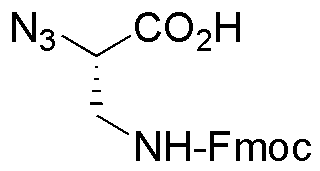Na-Azido-Nb-Fmoc-L-2,3-diaminopropionic acid is widely utilized in research focused on:
- Peptide Synthesis: This compound serves as a key building block in the synthesis of peptides, particularly in the development of novel therapeutic agents.
- Drug Development: Its unique azido group allows for click chemistry applications, facilitating the creation of complex drug molecules with improved efficacy.
- Bioconjugation: The compound is used in bioconjugation processes, enabling the attachment of biomolecules to surfaces or other molecules, which is crucial in diagnostics and targeted therapies.
- Research in Neuroscience: It is employed in studies involving neuropeptides, aiding in the understanding of neurological functions and potential treatments for neurodegenerative diseases.
- Material Science: The azido functionality allows for the modification of polymers, enhancing their properties for applications in coatings and drug delivery systems.
General Information
Properties
Safety and Regulations
Applications
Na-Azido-Nb-Fmoc-L-2,3-diaminopropionic acid is widely utilized in research focused on:
- Peptide Synthesis: This compound serves as a key building block in the synthesis of peptides, particularly in the development of novel therapeutic agents.
- Drug Development: Its unique azido group allows for click chemistry applications, facilitating the creation of complex drug molecules with improved efficacy.
- Bioconjugation: The compound is used in bioconjugation processes, enabling the attachment of biomolecules to surfaces or other molecules, which is crucial in diagnostics and targeted therapies.
- Research in Neuroscience: It is employed in studies involving neuropeptides, aiding in the understanding of neurological functions and potential treatments for neurodegenerative diseases.
- Material Science: The azido functionality allows for the modification of polymers, enhancing their properties for applications in coatings and drug delivery systems.
Documents
Safety Data Sheets (SDS)
The SDS provides comprehensive safety information on handling, storage, and disposal of the product.
Product Specification (PS)
The PS provides a comprehensive breakdown of the product’s properties, including chemical composition, physical state, purity, and storage requirements. It also details acceptable quality ranges and the product's intended applications.
Certificates of Analysis (COA)
Search for Certificates of Analysis (COA) by entering the products Lot Number. Lot and Batch Numbers can be found on a product’s label following the words ‘Lot’ or ‘Batch’.
Numéro de catalogue
Numéro de lot/série
Certificates Of Origin (COO)
This COO confirms the country where the product was manufactured, and also details the materials and components used in it and whether it is derived from natural, synthetic, or other specific sources. This certificate may be required for customs, trade, and regulatory compliance.
Numéro de catalogue
Numéro de lot/série
Safety Data Sheets (SDS)
The SDS provides comprehensive safety information on handling, storage, and disposal of the product.
DownloadProduct Specification (PS)
The PS provides a comprehensive breakdown of the product’s properties, including chemical composition, physical state, purity, and storage requirements. It also details acceptable quality ranges and the product's intended applications.
DownloadCertificates of Analysis (COA)
Search for Certificates of Analysis (COA) by entering the products Lot Number. Lot and Batch Numbers can be found on a product’s label following the words ‘Lot’ or ‘Batch’.
Numéro de catalogue
Numéro de lot/série
Certificates Of Origin (COO)
This COO confirms the country where the product was manufactured, and also details the materials and components used in it and whether it is derived from natural, synthetic, or other specific sources. This certificate may be required for customs, trade, and regulatory compliance.


